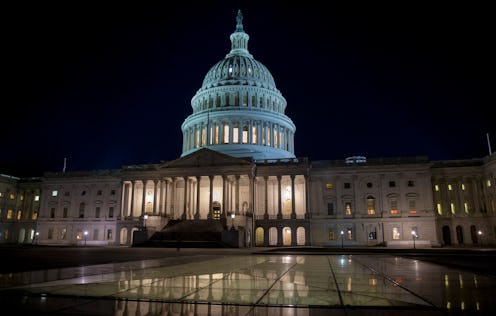News
Here’s How Congress Ended The Shutdown & What Everyone Gave Up

When reaching a full agreement on how to keep the government funded is just too challenging for congressional leaders, they often turn to short-term spending measures called continuing resolutions. On Monday, the third day of the government shutdown, the Senate voted on a continuing resolution to keep the government open until Feb. 8.
"After several discussions, offers, counter-offers, the Republican leader and I have come to an arrangement," Senate Minority Leader Chuck Schumer said Monday. "We will vote today to reopen the government to continue negotiating a global agreement, with the commitment that, if an agreement isn’t reached by Feb. 8, the Senate will immediately proceed to consideration of legislation dealing with DACA [Deferred Action for Childhood Arrivals]."
Although it won't last for very long, the continuing resolution will at least allow the government to keep running until Congress has passed a full appropriations act. It's generally accepted that successive continuing resolutions are not the most efficient or effective way to run a government, but congressional leaders on both sides have currently agreed that the short-term measure is preferable to keeping the government shut down.
Both Democrats and Republicans were working furiously over the weekend to come to an agreement about their next funding bill, and the Democrats' hold-up was mainly regarding DACA. They want a promise that congressional Republicans will begin working in earnest on a new bill to replace the Obama-era DACA program, which the Trump administration announced that they would end by the beginning of March.
The continuing resolution debated on Monday reportedly included the plan to consider a DACA bill, and, according to NBC News, a deal to extend CHIP for six years as well as the suspension of some taxes under the Affordable Care Act.
Congress last passed a continuing resolution on Dec. 22, and it funded the government through Jan. 19 — after which the latest government shutdown began, because of a failure to pass a new short term spending measure. It now looks as though the Senate will be able to pass another continuing resolution, which would at least allow federal employees to go back to work. The proposed bill, however, would only last through Feb. 8 — at which point it would be up to Congress to pass another appropriations bill, either short-term or long-term.
Ideally, Congress would pass a full appropriations bill before the beginning of every fiscal year — but that almost never happens. This is preferable to a series of continuing resolutions, because it provides security, allows Congress to work on other issues without constantly discussing spending, and allows for better planning. Although continuing resolutions have become a normal part of the functioning of the U.S. government, they're still really only stopgap measures that give Congress a chance to work out a more in-depth funding plan that then goes into a full appropriations bill.
Democrats who were hoping to hold out for real progress on DACA will be disappointed, because they voted to pass the spending plan with only McConnell's word that the Senate would soon begin a discussion of that particular immigration issue. While Schumer said that he was "confident" that McConnell would bring the DACA issue to the table in the very near future, McConnell's comments on the vote carried a slightly different tone.
"I think if we've learned anything during this process it's that a strategy to shut down the government over the issue of illegal immigration is something that the American people didn't understand," the senator from Kentucky said, referring to DACA as an "issue of illegal immigration."
Now, the House has to pass the bill, which will then go on to President Trump's desk. While Democrats currently seem to believe that they've got the promises that they were waiting for, it still remains to be seen whether congressional Republicans will keep them.